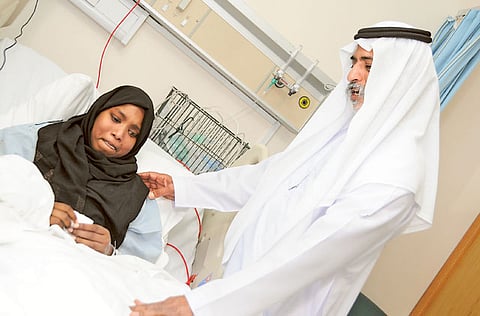UAE ready for more organ transplants
First procedure using deceased donor paves way for increase in number of available organs

Abu Dhabi: The success of the first kidney transplant from a deceased donor in the UAE indicates that the country is now ready for more such procedures, a leading medical professional said in the capital on Thursday.
In addition, allowing transplants from dead people also creates a greater pool of donors for those who need kidneys and other organs, said Dr Ammar Abdul Baki, consultant for transplant nephrology and medical director for transplantation at the Shaikh Khalifa Medical City (SKMC) in Abu Dhabi.
The successful kidney transplantation from a deceased donor was carried out last Thursday at the SKMC on Latifa Saeed Ahmad Mohammad, a 23-year-old Emirati from Al Ain. Latifa’s kidneys had failed when she was just seven years old and she had had to undergo dialysis multiple times each week until the procedure. The kidney donor was a 29-year-old man who died in a road traffic accident in Saudi Arabia.
“Until Latifa, all the kidney transplantation procedures in the UAE required living donors,” Dr Abdul Baki told Gulf News. “Recently, however, the relevant government entities have clarified the definition of brain death, which allows for organs to be harvested for transplantation from deceased donors.”
For organs to be transplanted from deceased donors, they must be certified to be brain dead by three specialists, including a neurologist. Family members must also give their consent in the UAE.
Currently, about 1,500 patients in Abu Dhabi emirate require regular dialysis. Each year, 150 new cases of patients with kidney failure are also recorded.
Since the programme was launched in 2008, 76 kidney transplants have been performed at the SKMC, the only certified transplantation centre in the UAE. Dr Abdul Baki said that the SKMC expects to perform 60 transplants in 2013 alone.
“Allowing for organ transplantations from deceased donors will increase the number of organs available,” said Dr Abdul Baki. “However, it will not yet be enough to cover all patients. In fact, even as more deceased donors contribute to the number of organs available, 70 per cent of kidney transplants will still continue to take place from living donors. This is the case in Saudi Arabia, in which the biggest number of GCC transplantations occurs.”
In the UAE, people are allowed to donate organs while alive to members of their families.
The SKMC also expects to perform its first liver transplantation this year and is working to develop capacity for other organ transplants, including heart, lungs, bowels etc. These organs are only available from deceased donors.
The National Organ Transplant Committee in the UAE, headed by Dr Ali Al Obaidli, chief clinical officer at the Abu Dhabi Health Services Company (SEHA), is also working on introducing donor cards that will indicate if a patient is willing to donate organs upon their death. Dr Abdul Baki, a member of the committee, said that the cards will become available within a month.
“A survey was conducted about three years ago which showed that 60 per cent of respondents were willing to donate organs,” he said. “We expect to see a positive response and interest for these donor cards.”
Those in need of transplants can also take hope from the fact that the UAE is a signatory to the Organ Transplantation Agreement between GCC countries. This agreement includes a policy for signatories to share 10 per cent of available organs.
“Most importantly, transplantation procedures for UAE residents are either covered by insurance or a government fund that not only provides for patient’s expenses but also those of the donor,” Dr Abdul Baki said.


